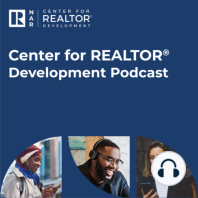65 min listen

050: Cybersecurity for every REALTOR® with Juanita McDowell
050: Cybersecurity for every REALTOR® with Juanita McDowell
ratings:
Length:
72 minutes
Released:
Jan 4, 2021
Format:
Podcast episode
Description
This episode is all about cybersecurity and protecting your information. Juanita McDowell joins Monica to share her effective and easy-to-implement tips to keep your data safe. They talk about what cybersecurity is, what we really need to protect, and best practices for several different platforms that agents use regularly in their business. Some agents will collect the same information as an online lender, with full disclosure to their client, so there is someone else they trust with this information. By law, personal information has to be protected. When it comes to sensitive information, the “biggies” are social security numbers and date of birth — especially birth year. As an agent, if you feel like you need to collect this information, it is your responsibility to destroy it when it’s no longer needed (shred) and protect it upfront (encrypt before making any digital copies). There are certain things you should never put online if you can avoid it; if a hacker or bot gets your information for one site, it is likely they can apply that information to other sites that may be more sensitive. When it comes to passwords, it’s no longer just a strong password — 2-step verification is key! When creating your password, incorporate lowercase, uppercase, symbols, and numbers. Once you have a strong password, a 2-step verification is an extra layer of security when you sign in from an IP address it doesn’t recognize. If passwords are a challenge for you, use a password locker like LastPass or One Password. You can also create a “master” password and add a memory jogger that is unique to each site you use your password for. We store so much information on our computers and phones, it’s important to safeguard those devices with passwords as well. Make sure those types of devices are virus protected as well. Juanita shares some best practices for using Dropbox, including what you should not post to Dropbox, features within Dropbox that you can use, and doing health checkups to see what all is accessing your DB account. With all the different systems we engage with every day, it’s incredibly important to know what they do and what’s the best use for them. Spend some time and take inventory of what applications and systems you are using, and do some security check-ups to make sure your apps are up-to-date. With subscription-based platforms, the user is the one that needs to tighten them up and make sure they are secure. If you use Google, Juanita’s homework assignment is to go to myaccounts.google.com and do a security checkup of your account. Although it’s convenient, it’s not the best idea to store passwords in your browser. A password locker would be better. All of your devices need a backup system! You need to make sure that your files are being backed up to a reputable cloud, and you want to double-check the security settings. Be very careful about what sensitive information you store in your CRMs. Do your due diligence in picking a CRM provider. The number one thing when it comes to email is to SLOW DOWN. Don’t open attachments or click on links from people you don’t know, and take a second look from people you do know. You can hover over a link or an email address to make sure it looks legitimate. The other thing about email is to make sure you are checking and responding on a secure network. A VPN is a virtual private network, and it creates a secure tunnel for any of your computer traffic when you’re in a public setting. Anything that is posted on social media could be read by anyone or everyone. Even if you delete a post, someone could have already saved or shared this with someone else. There are privacy settings on many social media platforms that can help you recover your data if it’s compromised. You should also set up 2-step verification for your social media accounts. If you have an account you aren’t using anymore, just take it down. One of the best tips for working with virtual assistants is to create a separate login
Released:
Jan 4, 2021
Format:
Podcast episode
Titles in the series (98)
024: Creating the Customer Experience with Pete Blank: Great customer service is one of the key ways we can set ourselves apart from other people in the industry. Everybody wants (and expects) a great customer service experience. Pete Blank joins Monica on the show today to talk about his customer service... by NAR’s Center for REALTOR® Development